Chevrolet Cruze Repair Manual: Installation Procedure
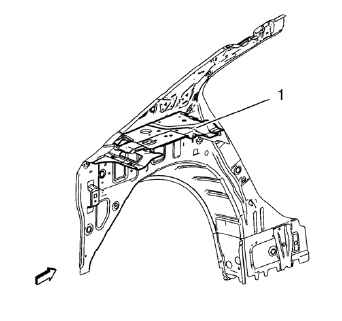
- Remove rear end upper panel extension (1) from service part.
Cut
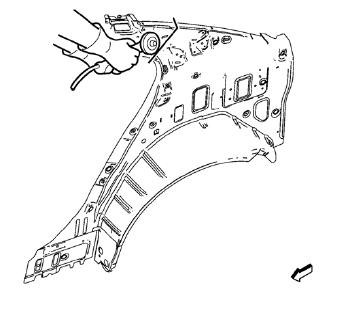
- Cut the body side inner panel in corresponding locations to fit the remaining original panel. The sectioning joint should be trimmed to allow a gap of one-and-one-half-times the metal thickness at the sectioning joint.
- Create a 50 mm (2 in) backing plate from the unused portion of the service part.
- Drill 8 mm (5/16 in) along the sectioning cut on the remaining original part. Locate these holes 13 mm (1/2 in) from the edge of part and spaced 40 mm (1 1/2 in) apart.
- Prepare all mating surfaces as necessary.
- Fit the backing plates halfway into the sectioning joints, clamp in place and plug weld to the vehicle.
- Align the body side inner panel.
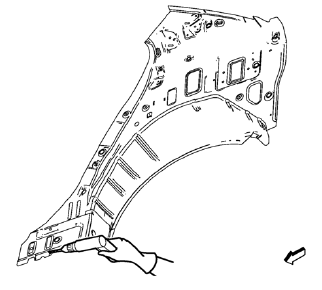
- Drill 8 mm (5/1 in) for plug welding along the edges of the body side inner panel as noted from the original panel.
- Clean and prepare the attaching surfaces for welding.
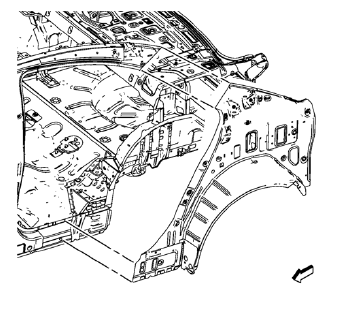
- Position the body side inner panel.
- Verify the fit of the panel.
- Clamp the body side inner panel into position.
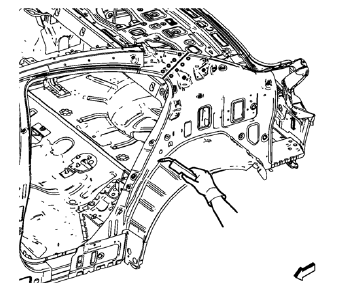
- Plug weld accordingly.
- To create a solid weld with minimum heat distortion, make 25 mm (1 in) stitch welds along the seam with 25 mm (1 in) gaps between them. Then go back and complete the stitch weld.
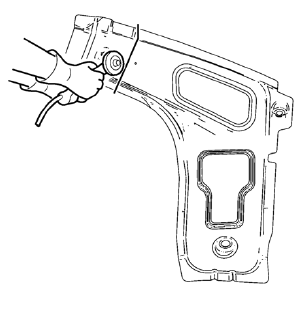
- Cut the body lock pillar upper reinforcement in corresponding locations to fit the remaining original panel. The sectioning joint should be trimmed to allow a gap of one-and-one-half-times the metal thickness at the sectioning joint.
- Create a 50 mm (2 in) backing plate from the unused portion of the service part.
- Drill 8 mm (5/16 in) along the sectioning cut on the remaining original part. Locate these holes 13 mm (1/2 in) from the edge of part and spaced 40 mm (1 1/2 in) apart.
- Prepare all mating surfaces as necessary.
- Fit the backing plates halfway into the sectioning joints, clamp in place and plug weld to the vehicle.
- Align the body lock pillar upper reinforcement.
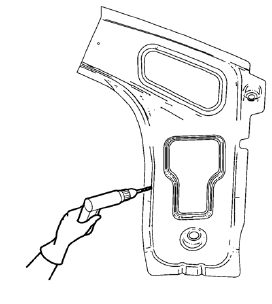
- Drill 8 mm (5/1 in) for plug welding along the edges of the body lock pillar upper reinforcement as noted from the original panel.
- Clean and prepare the attaching surfaces for welding.
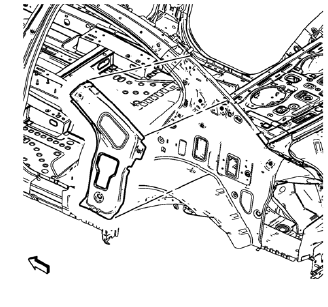
- Position the body lock pillar upper reinforcement.
- Verify the fit of the panel.
- Clamp the body lock pillar upper reinforcement into position.
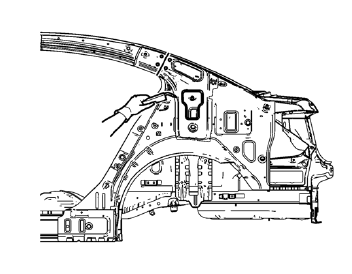
- Plug weld accordingly.
- Apply the sealers and anti-corrosion materials to the repair area, as necessary. Refer to Anti-Corrosion Treatment and Repair.
- Paint the repaired area. Refer to Basecoat/Clearcoat Paint Systems.
- Install all related panels and components
- Connect the negative battery cable. Refer to Battery Negative Cable Disconnection and Connection.
- Enable the SIR system. Refer to SIR Disabling and Enabling.
 Removal Procedure
Removal Procedure
Warning: Refer to Approved Equipment for Collision Repair Warning in the
Preface section.
Warning: Refer to Collision Sectioning Warning in the Preface section.
Warning: Refer to Glass and She ...
 Body Side Inner Panel Sectioning (MIG-Brazing)
Body Side Inner Panel Sectioning (MIG-Brazing)
Note: According to different corrosion warranties, only the
regional mandatory joining methods are allowed. ...
Other materials:
Installation Procedure
Cut the roof front header panel in corresponding locations to fit the
remaining original panel. The sectioning joint should be trimmed
to allow a gap of one-and-one-half-times the metal thickness at the
sectioning joint.
Create a 50 mm (2 in) backing plate from the unused portion of ...
Emergency
With Automatic Crash Response, the built-in system can automatically connect
to help in most crashes, even if help cannot be requested.
Press to connect to an Emergency
Advisor. GPS technology is used to identify the vehicle location and can provide
critical information to emergency personne ...
Power Steering System Description and Operation
The hydraulic power steering pump is a constant displacement vane-type pump
that provides hydraulic pressure and flow for the power
steering gear. The hydraulic power steering pumps are either belt-driven or
direct-drive, cam-driven.
The power steering fluid reservoir holds the power steerin ...
